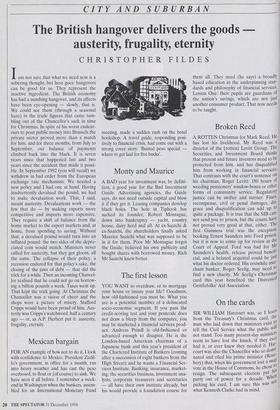CITY AND SUBURBAN
The British hangover delivers the goods austerity, frugality, eternity
CHRISTOPHER FILDES
Iam not sure that what we need now is a sobering thought, but here goes: hangovers can be good for us. They represent the inactive ingredient. The British economy has had a numbing hangover, and its effects have been eye-opening — slowly, that is. We could see them (through a seasonal haze) in the trade figures that came tum- bling out of the Chancellor's sack in time for Christmas. In spite of his worst endeav- ours to pour public money into Brussels the private sector proved more than a match for him, and for three months, from July to September, our balance of payments climbed back into the black. It is seven years since that happened last and two years since the accident that made it possi- ble. In September 1992 (you will recall) we withdrew in bad order from the European exchange rate mechanism. We needed a new policy and I had one at hand. Having inadvertently devalued the pound, we had to make devaluation work. That, I said, meant austerity. Devaluations work — the few that do — by making exports more competitive and imports more expensive. They require a shift of balance from the home market to the export markets and, at home, from spending to saving. Without that, a devalued pound would turn into an inflated pound: the two sides of the depre- ciated coin would match. Ministers never called for austerity, but they got gloom, all the same. The collapse of their policy, a recession endured for that policy's sake, the closing of the jaws of debt — that did the trick for a while. Then an incoming Chancel- lor realised that he could not go on borrow- ing a billion pounds a week. Taxes went up. That kept the trick going. At Christmas the Chancellor was a vision of cheer and the shops were a picture of misery. Stafford Cripps would have been proud of him. Aus- terity was Cripps's watchword, half a century ago — or, as A.P. Herbert put it: austerity, frugality, eternity.


























































 Previous page
Previous page